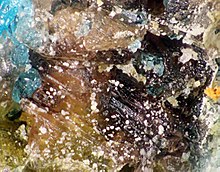Quenstedtite
Appearance
| Quenstedtite | |
|---|---|
 | |
| General | |
| Category | sulfate minerals |
| Formula (repeating unit) | Fe2(SO4)3·11H2O |
| IMA symbol | Qst[1] |
| Strunz classification | 7.CB.65 |
| Crystal system | Triclinic |
| Crystal class | Pinacoidal (1) (same H-M symbol) |
| Space group | P1 |
| Unit cell | a = 6.184 Å, b = 23.6 Å c = 6.539 Å; α = 94.18° β = 101.73°, γ = 96.27°; Z = 2 |
| Identification | |
| Color | white to very pale violet to red-violet |
| References | [2] |
Quenstedtite is an uncommon iron sulfate mineral with chemical formula Fe2(SO4)3·11H2O. It forms violet or white triclinic crystals. Found in oxidized zones of pyrite-rich orebodies, especially in arid climates. It was first reported in 1888 for an occurrence in Tierra Amarilla, Copiapó Province, Atacama Region, Chile and named by G. Linck in 1889 for the German mineralogist F. A. von Quenstedt (1809–1889).[2][3]
References
[edit]- ^ Warr, L.N. (2021). "IMA–CNMNC approved mineral symbols". Mineralogical Magazine. 85 (3): 291–320. doi:10.1180/mgm.2021.43. S2CID 235729616.
- ^ a b Mindat
- ^ Handbook of Mineralogy
